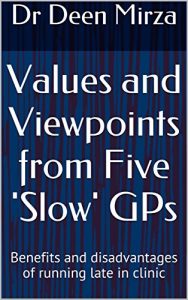This is the third part of a series aimed at GPs in the UK on how to be more efficient in the consultation. The whole premise for this series is that there are an increasing number of tasks and demands to complete within the GP consultation, which means many GPs struggle to run to time. This has a knock-on effect on the rest of the day’s work, as there is also an increasing workload of reports, letters, meetings and results waiting for you once you finish clinic. Running late regularly in such a context is unhealthy for most GPs. It can lead to burnout or people simply leaving. Managing your consultation time is one important skill (alongside many others) that you need to develop in order to survive and thrive in this profession.
The first part of this series presented a general guide on efficient consulting. The second part analysed interviews with 5 GPs who consult quickly. That book pioneered a new way of learning by interviewing real life clinical colleagues anonymously, who can share their valuable tips on what they actually do in real life.
This third book in this series will take an opposing view point. Five 'slow' consulting GPs have been interviewed with a view to finding out why and how they run late. This will enable the reader to analyse the personalities and values that underpin slow consulting, and will help GPs decide where on this spectrum they want to be.
The first part of this series presented a general guide on efficient consulting. The second part analysed interviews with 5 GPs who consult quickly. That book pioneered a new way of learning by interviewing real life clinical colleagues anonymously, who can share their valuable tips on what they actually do in real life.
This third book in this series will take an opposing view point. Five 'slow' consulting GPs have been interviewed with a view to finding out why and how they run late. This will enable the reader to analyse the personalities and values that underpin slow consulting, and will help GPs decide where on this spectrum they want to be.






